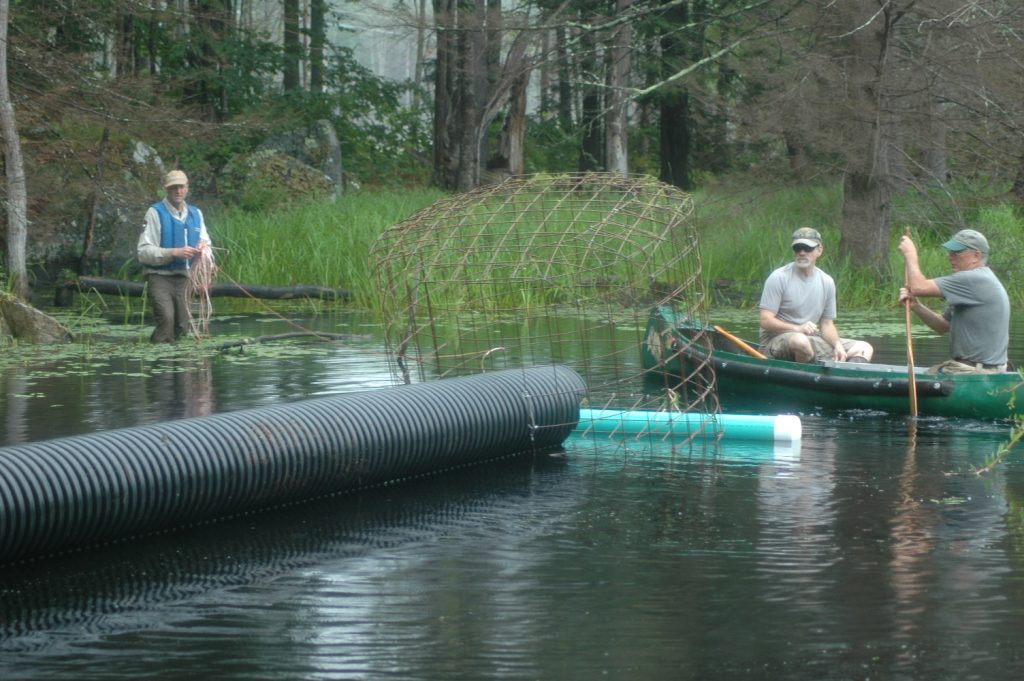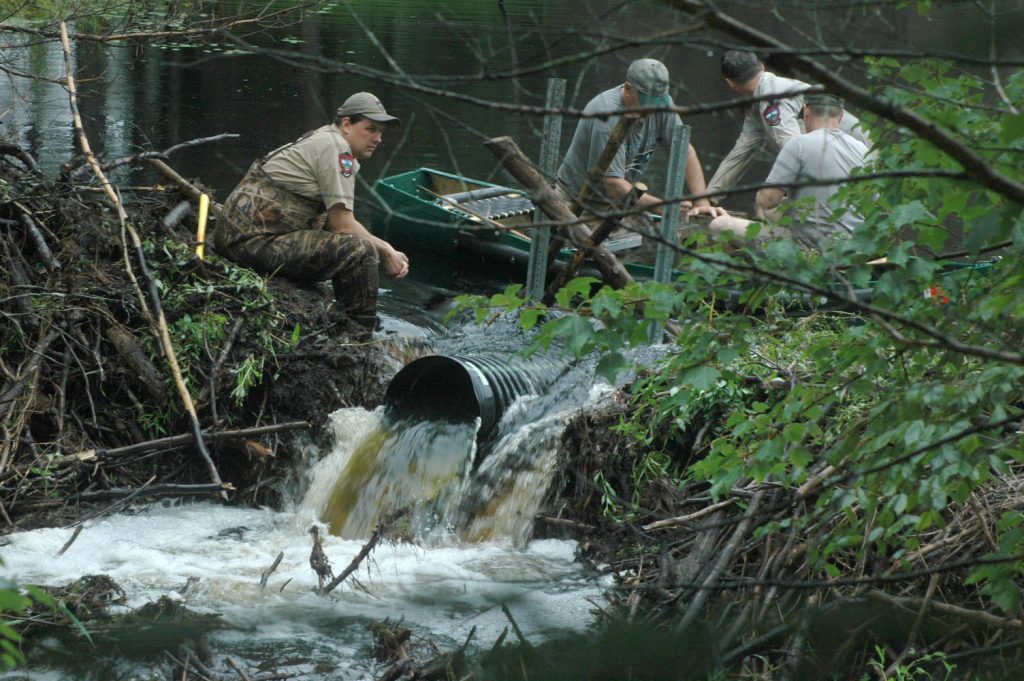August 31, 2016 at 2:37 pm
[caption id="attachment_1902" align="aligncenter" width="1024"] A beaver deceiver can keep water levels at a range that are manageable for both property owners and beavers. Photo courtesy of Lisa Bedell-Cheever.[/caption]
By Scott Lindsay, IFW Wildlife Biologist
Pictures Courtesy of Lisa Bedell-Cheever
With the abundance of wetlands in Maine providing quality wildlife habitat for a variety of species, regional staff are in consultation with many landowners regarding the management of wetlands, particularly with those that change under the influence of beaver.
Good road design and recreational trapping help minimize beaver related complaints, but at some chronic problem sites, a beaver deceiver is a viable long-term option. This structure, when property installed using good materials, can help achieve a water level that is acceptable to the beaver and the abutting landowners or road commissioner.
A beaver deceiver can keep water levels at a range that are manageable for both property owners and beavers. Photo courtesy of Lisa Bedell-Cheever.[/caption]
By Scott Lindsay, IFW Wildlife Biologist
Pictures Courtesy of Lisa Bedell-Cheever
With the abundance of wetlands in Maine providing quality wildlife habitat for a variety of species, regional staff are in consultation with many landowners regarding the management of wetlands, particularly with those that change under the influence of beaver.
Good road design and recreational trapping help minimize beaver related complaints, but at some chronic problem sites, a beaver deceiver is a viable long-term option. This structure, when property installed using good materials, can help achieve a water level that is acceptable to the beaver and the abutting landowners or road commissioner. Biologists in Region A-Gray have installed several of these, including one last week in South Berwick at a high value wetland owned by the Great Works Regional Land Trust. This structure utilizes a plastic culvert and heavy duty fencing installed in the beaver dam, allowing water to drain to a lower level. Three staff and 6 volunteers worked the better part of a rainy day on this installation. Any alteration of a beaver dam requires consultation with IFW.
Timing is also critical to minimize short term impact on wildlife. August and September are the best months to install a beaver deceiver. Costs vary based upon size of structure needed, but most installations cost under $400 for materials. The landowner is responsible for purchasing materials. The more suitable materials you can salvage, the lower the cost- Yankee frugality and ingenuity at its best. Some Animal Damage Control Agents deployed by MDIFW staff, are trained in the installation of beaver deceivers. For more information on wetland management, call a wildlife biologist at your nearest IFW regional office.
Biologists in Region A-Gray have installed several of these, including one last week in South Berwick at a high value wetland owned by the Great Works Regional Land Trust. This structure utilizes a plastic culvert and heavy duty fencing installed in the beaver dam, allowing water to drain to a lower level. Three staff and 6 volunteers worked the better part of a rainy day on this installation. Any alteration of a beaver dam requires consultation with IFW.
Timing is also critical to minimize short term impact on wildlife. August and September are the best months to install a beaver deceiver. Costs vary based upon size of structure needed, but most installations cost under $400 for materials. The landowner is responsible for purchasing materials. The more suitable materials you can salvage, the lower the cost- Yankee frugality and ingenuity at its best. Some Animal Damage Control Agents deployed by MDIFW staff, are trained in the installation of beaver deceivers. For more information on wetland management, call a wildlife biologist at your nearest IFW regional office.
 A beaver deceiver can keep water levels at a range that are manageable for both property owners and beavers. Photo courtesy of Lisa Bedell-Cheever.[/caption]
By Scott Lindsay, IFW Wildlife Biologist
Pictures Courtesy of Lisa Bedell-Cheever
With the abundance of wetlands in Maine providing quality wildlife habitat for a variety of species, regional staff are in consultation with many landowners regarding the management of wetlands, particularly with those that change under the influence of beaver.
Good road design and recreational trapping help minimize beaver related complaints, but at some chronic problem sites, a beaver deceiver is a viable long-term option. This structure, when property installed using good materials, can help achieve a water level that is acceptable to the beaver and the abutting landowners or road commissioner.
A beaver deceiver can keep water levels at a range that are manageable for both property owners and beavers. Photo courtesy of Lisa Bedell-Cheever.[/caption]
By Scott Lindsay, IFW Wildlife Biologist
Pictures Courtesy of Lisa Bedell-Cheever
With the abundance of wetlands in Maine providing quality wildlife habitat for a variety of species, regional staff are in consultation with many landowners regarding the management of wetlands, particularly with those that change under the influence of beaver.
Good road design and recreational trapping help minimize beaver related complaints, but at some chronic problem sites, a beaver deceiver is a viable long-term option. This structure, when property installed using good materials, can help achieve a water level that is acceptable to the beaver and the abutting landowners or road commissioner. Biologists in Region A-Gray have installed several of these, including one last week in South Berwick at a high value wetland owned by the Great Works Regional Land Trust. This structure utilizes a plastic culvert and heavy duty fencing installed in the beaver dam, allowing water to drain to a lower level. Three staff and 6 volunteers worked the better part of a rainy day on this installation. Any alteration of a beaver dam requires consultation with IFW.
Timing is also critical to minimize short term impact on wildlife. August and September are the best months to install a beaver deceiver. Costs vary based upon size of structure needed, but most installations cost under $400 for materials. The landowner is responsible for purchasing materials. The more suitable materials you can salvage, the lower the cost- Yankee frugality and ingenuity at its best. Some Animal Damage Control Agents deployed by MDIFW staff, are trained in the installation of beaver deceivers. For more information on wetland management, call a wildlife biologist at your nearest IFW regional office.
Biologists in Region A-Gray have installed several of these, including one last week in South Berwick at a high value wetland owned by the Great Works Regional Land Trust. This structure utilizes a plastic culvert and heavy duty fencing installed in the beaver dam, allowing water to drain to a lower level. Three staff and 6 volunteers worked the better part of a rainy day on this installation. Any alteration of a beaver dam requires consultation with IFW.
Timing is also critical to minimize short term impact on wildlife. August and September are the best months to install a beaver deceiver. Costs vary based upon size of structure needed, but most installations cost under $400 for materials. The landowner is responsible for purchasing materials. The more suitable materials you can salvage, the lower the cost- Yankee frugality and ingenuity at its best. Some Animal Damage Control Agents deployed by MDIFW staff, are trained in the installation of beaver deceivers. For more information on wetland management, call a wildlife biologist at your nearest IFW regional office.
Categories